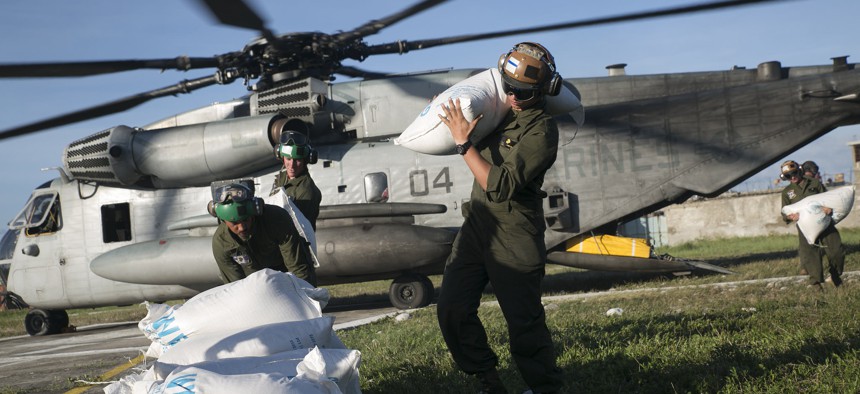
Joint Task Force Matthew delivered over 10,000 pounds of supplies on their first day of relief operations. Cpl. Kimberly Aguirre / Marine Corps
The U.S. Relief Mission to Haiti Is Also a Signal to America’s Neighbors, and Russia
The leader of U.S. Southern Command hopes helpful actions speak louder than Moscow’s words.
When U.S. Southern Command dispatched nearly 2,000 Marines, a dozen helicopters, and one amphibious assault ship to Haiti earlier this month, it was an effort to provide lifesaving assistance in the wake of Hurricane Matthew. But the operation also served as a reminder to regional friends and neighbors that they needn’t turn to Russia, SOUTHCOM commander Adm. Kurt Tidd said Tuesday.
Though the U.S. has largely enjoyed uncontested access to Latin America since the Cold War, Russia has in recent years been cozying up to historical allies in the region. Today, Moscow is running what Tidd called a “very aggressive” propaganda campaign to paint the U.S. as an unreliable, uninterested ally and Russia as a “viable alternative.”
“We just need to recognize that whether we like it or not, they are engaged in a competition for influence, and we can acknowledge that, we can ignore that, or we can engage in competition as well,” Tidd told an audience at the Center for Strategic and International Studies in Washington, D.C.
As the hurricane swept through the Caribbean and across Haiti’s vulnerable southwestern tip, Tidd said, the military prepared to send aircraft to help international and nonprofit aid organizations already on the ground.
“When you look at the response to Haiti, we had at one point in time 12 helicopters—heavy-lift and medium-lift helicopters—flying aid and meeting the vital needs of the Haitian people,” he said. “I didn’t see any Russian helicopters out there.”
Last year, Tidd’s predecessor Gen. John F. Kelly warned Congress that with Vladimir Putin’s return to the presidency, Russia had returned to “Cold War-tactics” and was attempting to “erode U.S. leadership and challenge U.S. influence in the western hemisphere.”
In addition to arms deals, trade, and the propaganda campaign Tidd mentioned, Kelly pointed to a Russian intelligence ship that “docked in Havana multiple times while conducting operations in the Gulf of Mexico and along the east coast of the United States.”
Since then, U.S.-Russia relations have only grown more fraught. In the last month alone, there’s the failed ceasefire in Syria, an official accusation that Russia is interfering with the U.S. election, and the suspension of one of the last remaining nuclear disarmament agreements between the two countries.
And even as the two nations work together in some areas, relations are at a 40-year low, “probably the worst...since 1973,” says the Russian ambassador to the United Nations, Vitaly Churkin.
Meanwhile, Tidd said, SOUTHCOM has to “be mindful” of how Russian activity here fits within that larger global context, even if Russia’s vital national interests may not extend to the Western Hemisphere.
“They are reinvesting a significant amount in historical relationships that they have had in Cuba, Nicaragua, and Venezuela,” he said. “So we have to watch that…we can’t afford to ignore their presence.”
NEXT STORY: Should Sailors Be Able to Reprogram Their Ship?







